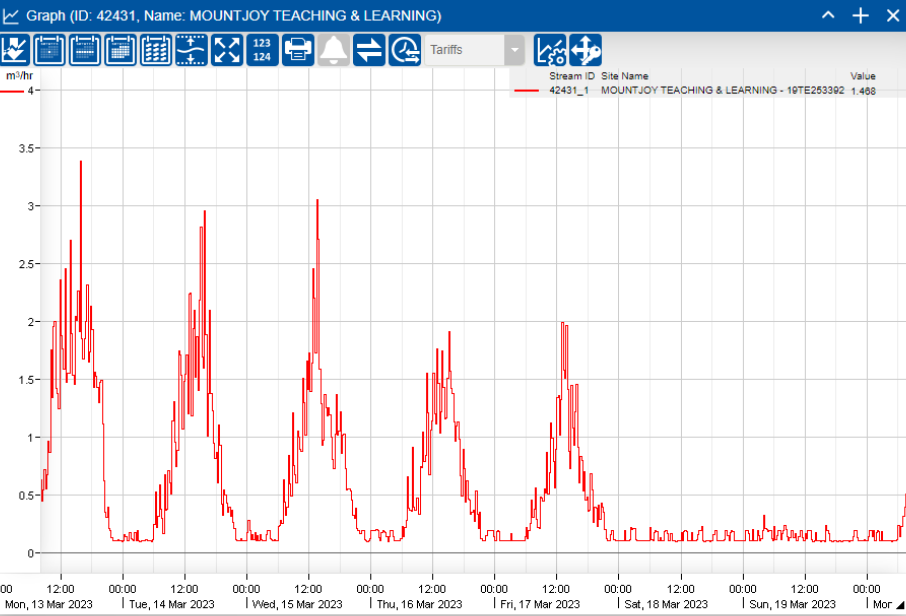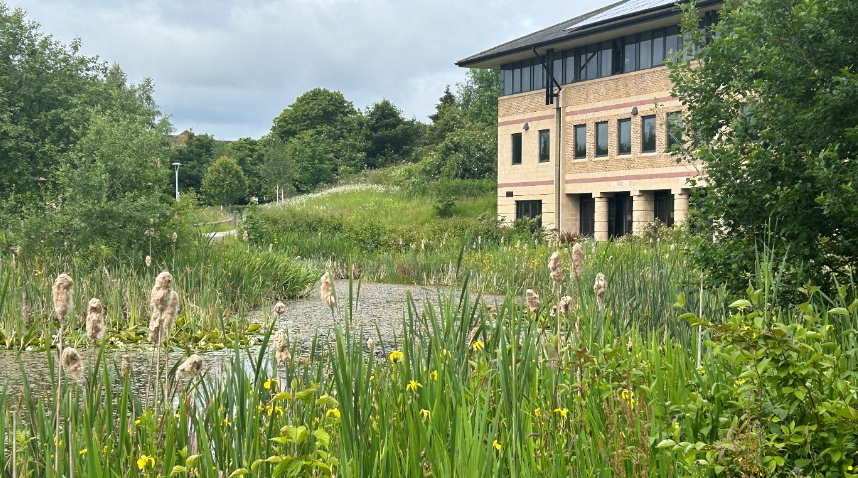Water
The University works to provide free access to safe water whilst also minimising usage.
Free Drinking Water
Durham University joined the nationwide 'Refill' campaign in the spring of 2018. This aims to connect people to food, drink and shopping without the need for single use packaging.
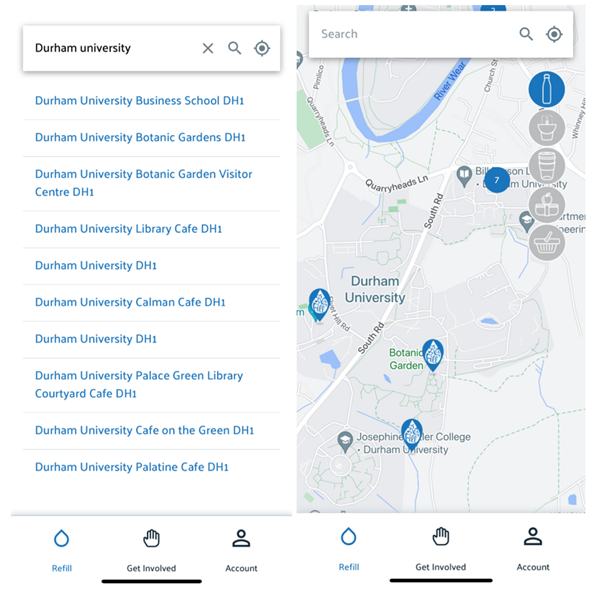 a
a
The University provides free drinking water to staff, students and visitors across all of its public cafes as well as mains water stations at many other sites.

As part of the Refill scheme, University cafes also all offer drinks in reusable cups without the 25 pence levy now applied to hot drinks purchased in disposable cups. More information, about our wider work on sustainable food is available within our Sustainable Food Policy.
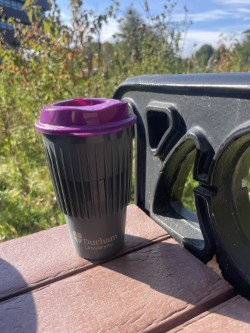
Shower Timers
As a means of conserving water, the University Greenspace team have provided Colleges with 4-minute shower timers to encourage students to save water by taking shorter showers.
The idea for this initiative came from Josephine Butler College, who originally trialled the shower timers and had very positive feedback.
Water Awareness
We run an annual water awareness campaign which aim to highlight and eliminate water wastage.
Our annual Greenspace Calendar 2025-2026 highlights key moments where the team works on water, as did former years: Greenspace Calendar 2024-2025. Greenspace plan communications and initiatives during events such as World Water Day in March, our annual ‘April Showers’ campaign, Waterwises’s Water Saving Week in May, and ‘World Refill Day’ on 16th June.
Aquatic Stewardship
Durham University’s Biodiversity Strategy notes that the increased biodiversity we are striving towards will “offer higher levels of ecosystem services such as water filtration, flood prevention and nutrient cycling”. Our biodiversity baselining of amphibians and reptiles gives data on the water quality of our Estate and the wider area. In order to support and grow populations of species including Common Frog, Common Toad and Smooth/Palmate Newts, we are creating new ponds and mini wetlands on our Estate.
One of the principles within our strategy is to “Work to enhance soil management across the Estate (e.g. establish compost heaps to recycle suitable green waste) and to minimise detrimental run-off into waterways” – see page 11.
As part our work on Biodiversity, we value the contribution that the Wear Rivers Trust makes as part of our Biodiversity Sub-Group.
Community Engagement and Education
Durham University works in partnership with other local organisations to care for our local water- this includes promoting conscious water usage on campus and in the wider community through practical conservation initiatives such as 'Refill'. The University signed up to Durham City’s Single Use Plastic pledge via Duram County Council – this also promotes the Refill mobile app for city-wide water stations.
As well as monitoring taxa such as aquatic plants and amphibians on our own estate’s ponds and river through our Biodiversity Strategy and Action Plan, we also work in partnership on issues such as monitoring the health of our local aquatic ecosystems and playing our part in delivering good aquatic stewardship practices.
Durham University is proud to be part of The Wear Catchment Partnership alongside others including the Wear Rivers Trust, two neighbouring local authorities, Durham Wildlife Trust, the Woodland Trust, the Environment Agency, Northumbria Water and Groundwork North East. The partnership strives to preserve and enhance the benefits provided by our river and its wider catchment. These include plentiful, clean water; high quality connected habitats supporting diverse and abundant wildlife; tranquil green and blue spaces for recreation and wellbeing; or natural carbon capture and protection from flooding.
The Water Hub is a collaborative initiative between Durham University, Durham County Council, the Environment Agency and Northumbrian Water. It aims to engage with Small and Medium-sized Enterprises (SMEs) in the North East of England to identify and develop innovative, practical solutions to challenges in the whole region’s water sector through challenge events, partnership working, flexible small grants and access to test facilities.
We continue to provide an educational offer to our university members, as well as wider community. This year, for example, at our annual Greenspace Festival, the Sustainability team held a series of free presentations, talks and learning opportunities open to the public – these included sessions on freshwater eco-systems such as by the Wear Rivers Trust looking at river catchment management, approaches and conservation as well as information on monitoring river health through riverfly measurement. We continue to promote opportunities for the wider community to engage with training opportunities such as water insect monitoring and water literacy.
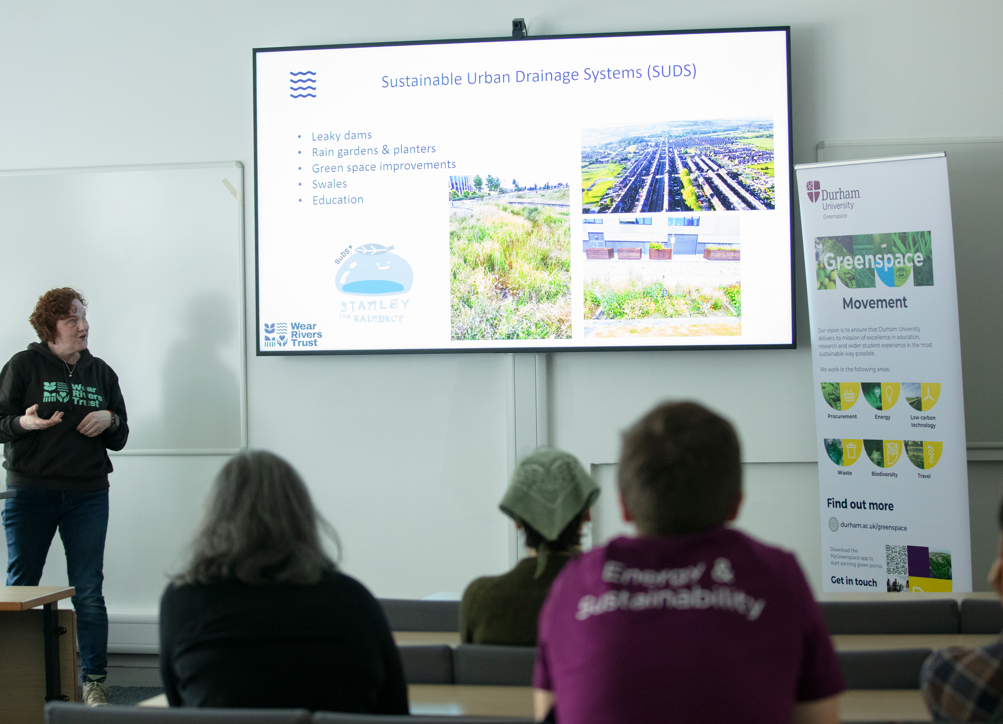
We also offer learning opportunities such as pond dredging practical sessions which offer both hands-on experience with theoretical approaches to aquatic biodiversity – these include at our Botanic Gardens.
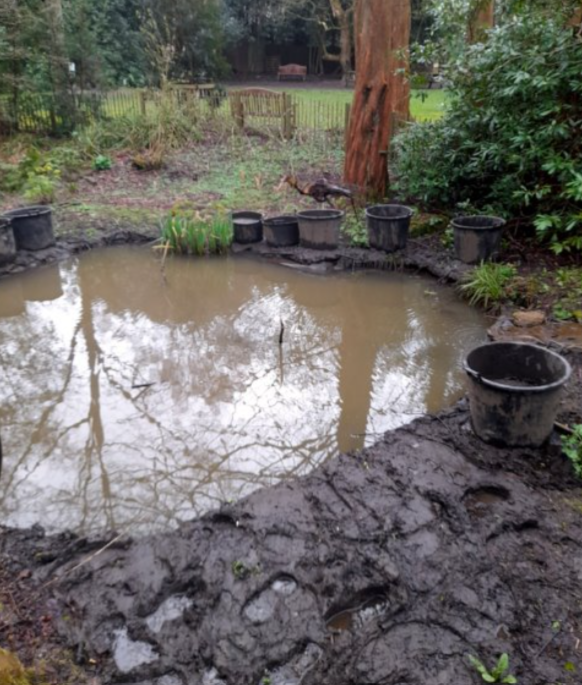
Research
Durham University’s world-leading research also contributes to aquatic ecosystem health globally, for example through the Geography Department’s Catchments and Rivers Cluster which monitors and models the interactions and feedbacks between geomorphology, hydrology, vegetation, and water chemistry in hillslope and river systems and Professor Kostas Nikolopoulos’s work on Ocean Radioactivity and its global impact. For wider examples of research which is contributing to Environmental Sustainability, read our ‘Protecting our planet: How Durham University's research helps to safeguard the environment’ which includes our project on ‘Improving Water Sustainability and Flood Resilience’ in partnership with the Environment Agency (page 5).
Refurbishment and new buildings
As we refurbish our estate, and build new buildings, we are taking water into account. An example of a project that has recently been completed is at one of our colleges, Van Mildert, where we have replaced showers with new heads that minimise maintenance and cleaning regimes, as well as the flow rate of water. Going forward we will take lessons learnt from this replacement to use elsewhere.
For new buildings, we are committed to minimising our water consumption and set challenging reduction targets through our publicly-available Sustainable Construction and Renovation Policy which seeks to ensure “all renovation projects set challenging carbon, energy, water, waste fugitive gases and transport reduction targets based on the existing performance of the building and clearly demonstrate this target within project documentation”.
Measuring water consumption
Durham University measures water consumption using automatic meter readings that gives us half hourly data. This allows us to identify excessive water use or leaks and action repairs as quickly as possible. We partner with our Water supplier, Wave, and our meter provider, Technolog, to perform automatic meter reading.
This gives us information on water use that we can review to identify areas for water conservation, using our water meter portal, such as in the image below showing our Teaching and Learning Centre.
We report on our annual water consumption to HESA as part of our Estates Management Record.
Annual water use
The volume of our total water use for the last 3 financial years is listed below:
|
|
2021-22 |
2022-23 |
2023-24 |
2024-25 |
|
Water (m3) |
356,219 |
387,765 |
382,539 |
340,829 |
Watershed Management and Pollution Prevention
Management of our watershed is an integral part of the Durham University Biodiversity Strategy -Enhancing Biodiversity at Durham 2022-2032 where we have committed to:
- Manage riparian habitats to reduce erosion, increase in-stream and bankside diversity and create undisturbed areas;
- Maintain existing ponds to maximise wildlife benefit. New ponds should also be created across the estate to better link existing ponds and wetland habitat;
- Work to limit the extent of sealed surfaces to reduce runoff, which can effect both flooding of terrestrial areas and pollution to aquatic habitats; and
- Reduce chemical use across the estate including pesticides, herbicides, insecticides, vermicides, molluscicides, fungicides and fertilizers.
As part of our environmental management system, which we internally audit continuously and externally audit annually, we carry out a policy that minimises risks of any discharge to our wastewater including form land-based activities. These formal policies and public commitments form part of our work and planning to minimise physical, chemical and biological alterations of related aquatic ecosystems; we work to maintain water quality standards and enforce guidelines for water discharges to protect ecosystems and marine wildlife, but also human health and welfare.
Outside of the specific action we are taking on the University estate, we also work closely with local partners to help manage the marine environment both up and downstream of the city.
Working with the Wear Catchment Partnership we are finding ways to track the waste that enters the river around the city and are exploring a variety of options for its removal, including a plastics waste barrier.
As part of our work to reduce Marine Pollution, Durham University has provided advice and support to our neighbours, East Durham College Houghall Campus which specialises in agriculture, animal care, horticulture, arboriculture, and other land-based studies
This support is in the form of advising the college and offering practical help a range of issues such as reducing residual run-off into the River Wear. We are supporting them with a potential mixed woodland creation planning grant looking at a range of habitats to be located between Durham University land and the River Wear- ensuring the right habitat is in the right location will greatly help to absorb possible pollutants from reaching the River Wear. As well as minimising water pollution, this helps create and extend woodland and other habitats that will enhance biodiversity connectivity through strategically-located wildlife corridors and allow wildlife to move to and from the university estate and into the wider landscape.
We also collaborate practically with partners on River Wear Catchment work, such as community events including litter picks along the river banks and volunteer activities which seek to minimise and eradicate invasive or non-native species on our riverside to maintain healthy, shared aquatic ecosystems.
Read our Biodiversity Strategy.
Read our Grounds Management Policy No 2025.
Read our Discharges to Water Process.
Water reuse and water-conscious planting
We have several rainwater harvesting systems which operate in buildings across our estate. This means we minimise the mains water that is used in our toilets within buildings.
The rainwater collected across these buildings is metered and the data is shown below.
|
|
|
2021/22 |
2022/23 |
2023/24 |
|
Rainwater harvesting |
m3 |
236 |
257 |
469 |
For example, in the last year, the Ogden Centre for Fundamental Physics reused 31 cubic meters of rainwater. Our metered data at this site can be seen below.
We also have a range of Sustainable Drainage Systems that capture rainwater around our estate.
We use rainwater as part of our planting and watering around the University. This includes projects like our mini-wetlands around which use rainwater with native plants to enhance biodiversity across the University Estate.
We are moving to increasingly planting native species mixes for landscaping and amenity planting which, by their very nature, require no watering. Across our estate, we are also using drought-tolerant borders on exposed sites, for example our Mediterranean border to the South of our Biosciences building. Further details of our work for nature and biodiversity is available at our public pages on our Biodiversity Strategy, Targets and Successes page as well as further detail on our updates at Greenspace - BIodiversity Updates page.
Water extraction
We extract a small amount of water from a borehole to support the maintenance of our sports pitches at the Graham Sports and Wellbeing park. This borehole is under abstraction licence from the Environment Agency and managed sustainably. We monitor water use at this borehole with Automatic Meter Reading that gives half-hourly data; excess values provide alarms so that we can ensure we are not wasting extracted water.


/prod01/prodbucket01/media/durham-university-business-school/study/dba/Home-Page-Banner-or-Footer.png)

